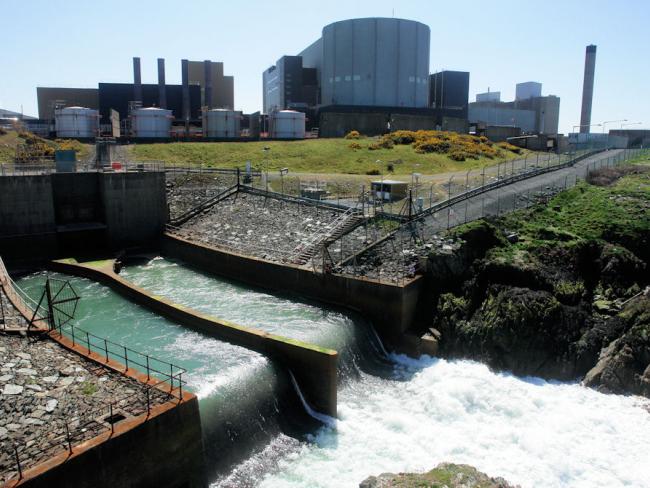19 January 2019

The old Wylfa Magnox nuclear power station at Wylfa, now decomissioned. Photo Talsarnau Times (CC BY-SA 3.0)
Hitachi has announced it will abandon development of the Wylfa Newydd nuclear power station. The £16 billion project would have supplied about 6 per cent of Britain’s electricity.
Britain’s independent nuclear energy policy is now in disarray. The Japanese conglomerate’s plan for another station at Oldbury in Gloucestershire is likely to be withdrawn. And two months ago, Toshiba ditched its project at Moorside in Cumbria and scrapped its UK nuclear division after failing to find a buyer.
Damage
The loss of around 850 highly skilled engineering jobs at Wylfa, coupled with up to 9,000 involved in construction, is a blow to the economy of North Wales. Similar losses will be repeated at the other sites. But the damage goes far wider.
Successive governments have not been enthusiastic about nuclear power, but had to recognise its place in a balanced energy mix. Supply from renewable sources is intermittent, and the alternatives apart from nuclear create carbon emissions.
The government’s 2013 nuclear strategy included building up to 12 nuclear reactors by 2030, providing about 30 per cent of the expected demand. Now only three sites remain. Hinkley Point is under construction, with questions about its technology and economics. Bradwell in Essex and Sizewell in Suffolk are planned, but their completion is uncertain.
"Britain’s weak-kneed government is desperately scrambling around."
Britain’s current weak-kneed government is left desperately scrambling around to explore unsatisfactory alternatives. It will have to burn more fossil fuels, increase the pace of its renewable energy investment or rely more heavily on Chinese investment.
This cannot go on. There has to be a strategic shift as we leave the EU and its aversion to governmental, state-led intervention. Britain must quickly develop a national nuclear body again and invest for the future.
We must build on the construction, technical and engineering skills still available and establish the expertise necessary to build our own new nuclear plants. Then we will not be susceptible to foreign companies charging the earth or failing to come up with the goods.
Independence
Business secretary Greg Clark bewailed the failure to secure a deal with Hitachi, despite a “generous and significant” package of support. That included a guaranteed price of £75 per megawatt hour for 35 years against a current market price of £50.
The government set a precedent with the Hinkley agreement, which set a guaranteed £92 per megawatt hour. Private industry now sees that as the starting point for negotiations. The government faces this dilemma every time it looks to private, often foreign, capital to finance the rebuilding of our power industry. Independence is the alternative.
